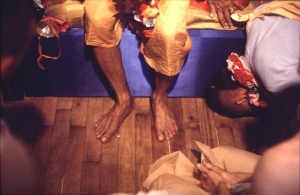CC Madhya 24.266 (1975)

A.C. Bhaktivedanta Swami Prabhupada
TEXT 266
- grāme dhvani haila,--vyādha 'vaiṣṇava' ha-ila
- grāmera loka saba anna ānite lāgila
SYNONYMS
grāme—in the village; dhvani haila—there was news; vyādha—the hunter; vaiṣṇava ha-ila—has become a Vaiṣṇava, a lover and servitor of Lord Viṣṇu; grāmera loka—the villagers; saba—all kinds of; anna—food; ānite lāgila—began to bring.
TRANSLATION
"The news that the hunter had become a Vaiṣṇava spread all over the village. Indeed, all the villagers brought alms and presented them to the Vaiṣṇava who was formerly a hunter.
PURPORT
It is the duty of the public to present a gift to a saintly person, Vaiṣṇava or brāhmaṇa when going to see him. Every Vaiṣṇava is dependent on Kṛṣṇa, and Kṛṣṇa is ready to supply all of life's necessities, provided a Vaiṣṇava follows the principles set forth by the spiritual master. There are certainly many householders in our Kṛṣṇa consciousness movement. They join the movement and live in the society's centers, but if they take advantage of this opportunity and do not work but live at the expense of the movement, eating prasāda and simply sleeping, they place themselves in a very dangerous position. It is therefore advised that gṛhasthas should not live in the temple. They must live outside the temple and maintain themselves. Of course, if the gṛhasthas are fully engaged in the Lord's service according to the directions of the authorities, there is no harm in their living in a temple. In any case, a temple should not be a place to eat and sleep. A temple manager should be very careful about these things.